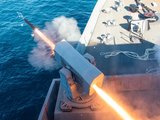Boeing announces beam control contract
Boeing has won a contract for developing a beam control system that could be used to provide accuracy for laser weapons on US Navy warships, the company announced on 17 February.
Under the contract, Boeing will design and develop a prototype High Power Beam Control Subsystem (HP BCSS) compatible with solid-state High Energy Lasers (HEL). The prototype will be compatible with systems that are being developed for the Office of Naval Research's (ONR's) solid state laser technology maturation programme.
The beam control system will focus and hold a laser on a moving aimpoint for long enough to disable the target - a challenge, given the constant motion of the maritime environment.
The contract will capitalise on work performed by Boeing with the US Army's HEL Mobile Demonstrator (MD), which underwent successful demonstrations at Eglin air force base in Florida in 2014.
During these demonstrations, the HEL MD acquired, tracked and destroyed targets in foggy and windy conditions. ONR shared technical data on energy systems in maritime environments with Boeing and the army. In recent testing, the HEL MD also disabled unmanned aerial vehicles and mortars.
More from Naval Warfare
-
![How the Hedge Strategy will impact the US Navy’s future capabilities]()
How the Hedge Strategy will impact the US Navy’s future capabilities
The US Navy Hedge Strategy is intended to provide a lethal, modular and cost-effective fleet while accepting Washington’s fiscal and industrial constraints.
-
![US Navy and Raytheon explore additional applications for Mk 58 CRAW torpedo]()
US Navy and Raytheon explore additional applications for Mk 58 CRAW torpedo
Designed as an anti-torpedo and anti-submarine capability, the USN and RTX foresee the Compact Rapid Attack Weapon’s potential for deployment from surface ships and aerial and uncrewed platforms.
-
![European navies line up $105.8 billion in unawarded contracts for 2026]()
European navies line up $105.8 billion in unawarded contracts for 2026
France, Germany and Italy lead the way on unawarded naval defence opportunities that could be awarded this year, but across Europe countries are ramping up their spending efforts to face geopolitical challenges.
-
![Spain’s F100 upgrade mirrors Aegis modernisation paths in allied navies]()
Spain’s F100 upgrade mirrors Aegis modernisation paths in allied navies
The Spanish Navy’s Alvaro de Bazan-class of air defence frigates will receive the latest Aegis Weapon System technology among other modernisations to extend the service life to 2045.






















